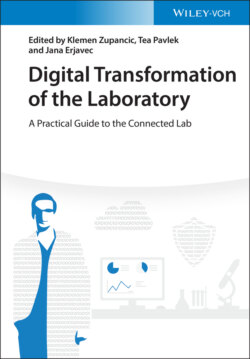Читать книгу Digital Transformation of the Laboratory - Группа авторов - Страница 9
ОглавлениеPreface
The subject of digital transformation is actually about you.
Your science, your everyday work environment, your partnerships and collaborations, and the impact of your work on the future of scientific progress.
Welcome to this book.
As a brilliant astronomer, Maria Mitchell once said, “mingle the starlight with your lives and you won't be fretted by trifles.”
The greater meaning of digital transformation shifts the perspective toward the global scheme of things. The main evaluating factors behind the lab digitalization and digital transformation answer important questions: Are we improving the quality, efficiency, and the pace of innovation?
Lab digitalization is a people‐driven initiative that aims to address the global challenges and provide solutions, backed by unquestionable integrity of traceable and reproducible scientific data.
At the moment, regardless of the laboratory type or size, people are struggling with the growing amount of generated data and leveraging its value. It is extremely challenging to organize data and keep everything traceable and reusable long term.
To address the challenge, modularity and flexibility are being incorporated on different levels of lab operations. Labs are becoming inviting spaces suitable for interdisciplinary partnerships in a digital, virtual, or personal environment. Data integrity initiatives and setup of new, digital systems prioritize integration of all tech solutions used in the lab for optimal performance. Through effective integration of tools, improved scientist‐to‐scientist interactions and intellectual contributions, and quality change management, lab digitalization places the human element at the very forefront of the overall progress toward the digital future.
This can be intimidating to some and exhilarating to others.
That is why this book is divided into modules: Inspiration, Knowledge Base, Practical, Case Studies, Continuous Improvement, and Vision of the Future. Each module covers different aspects of lab digitalization.
Inspiration
We start this book with an inspiring overview of lab evolution, new technologies, and new science being done. It will give you a complete overview of the subject of laboratories of the future and, hopefully, add to the vision of your own career in science and technology.
Knowledge Base
Knowledge Base section focuses on crucial terms to understand. It will give you a solid basis of knowledge that you will be able to apply further on as your lab grows and evolves.
Practical
The Practical chapters give you examples and guidance on defining your lab's digitalization strategy.
Case Studies
We present different case studies and expert comments on the subject of going from paper to digital. You will be able to read how different laboratories and professionals approached the subject and put it into practice, and what are their conclusions, advice, and lessons learned.
Continuous Improvement
We have a closer look at the steps that follow after the digitalization.
Vision of the Future and Changing the Way We Do Science
With continuous improvements in mind, we conclude the book with insightful expert comments on the subject of the future of science. Many of the described technologies are already becoming important, and here we identify those that might shape the next 5–10 years and change the way we do science.
As you read this book, you will gain holistic knowledge on digital transformation of the laboratory. Tracking, analyzing, and leveraging the value of data you are collecting, by implementing tools that can empower the people in your lab, are the main points of this journey.
Using the knowledge, you will be able to start defining what exactly you want to achieve. Once you clarify your main goals, you will be able to go all the way back through the processes in your lab and see which need to be digitalized.
That is when you will get the real incentive to do it.
You will understand whether you are trying to just use technology as a convenience to support the system you already have, or are you ready to think about using the better technology to change and improve the system.
You will realize what kind of decisions you need to make throughout the cycle.
Selecting the right digital solutions is quite a challenge. It is important to think how the potential solutions will fit into your existing architecture. An investment of time, energy, and budget is always involved, especially if the solutions are not integrated properly or your team is not in sync.
The knowledge you will gain will enable you to measure and evaluate the impact of digitalization. How will the use of particular tools improve specific parts of your processes to reach your goals within the given time frames?
Keeping the razor‐sharp focus and determination is the most potent driver of digitalization.
All solutions work, but the execution is crucial. You will learn how to take an agile approach, define the value for your team, start small, and scale up efficiently and successfully.
This book is a result of collaboration between different authors – researchers, business owners, consultants, managers, and professors who wrote about their vast experience and provided valuable perspective on the subject of digital transformation. Because every lab is different, and there are as many use cases as there are labs, our aim was to introduce you to a digital mindset that will enable you to find the best solution for your lab.
This book guides you through the aspects of taking your time to understand the basics of technology, adapt the digital mindset, include your team and address their concerns and challenges, read how other labs started to pave their digital way, and stay inspired along the way.
Let's dive in.
Tea Pavlek
SciNote LLC, USA
